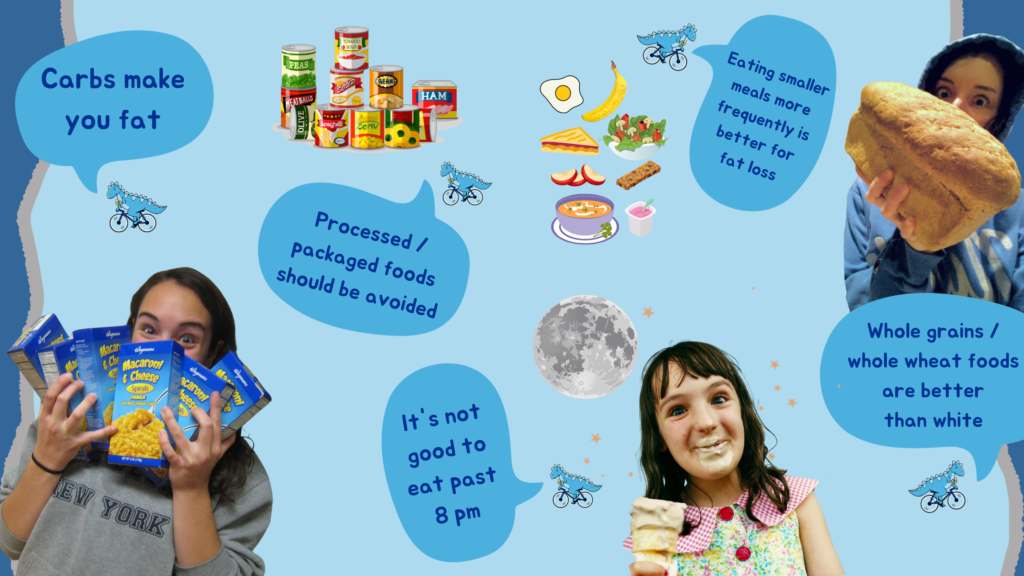
There’s a ton of information out there about nutrition, fat loss, strategies, tactics – and unfortunately, a lot of it just isn’t true.
Here, I discuss five of the most common nutrition myths that I’ve seen (some of which I’ve believed myself) and that I continue to see my clients, peers, and friends fall for. It’s not your fault, folks – it may have come from a source you trust or a source that’s been helpful to you in the past, but sadly, with all due respect, they’re wrong.
I’ll break down each one and tell you why, with a spoiler alert right off the bat: CARBS ARE YOUR FRIENDS.
Let’s get into it.
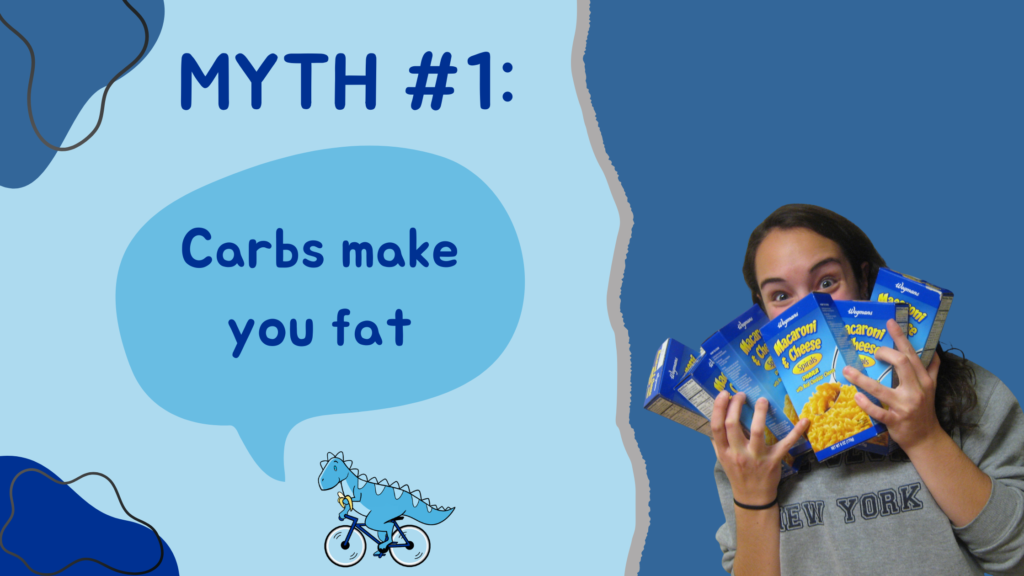
MYTH #1: CARBS MAKE YOU FAT
Quick story:
Recently, a client told me they saw a documentary about people who lost a ton of weight.
“They did it by cutting carbs,” my client explained. “They were no longer eating entire bags of potato chips or a pound of pasta.”
…hang on a second.
They were no longer eating ENTIRE BAGS of potato chips or A POUND of pasta.
Those quantities tell us something super important.
It wasn’t the fact that those foods were made up of mostly carbs. It was the fact that they were substantially overeating when having them.
A calorie surplus leads to fat gain. Not carbs themselves.
Friends: CARBS ARE NOT THE ENEMY.
Carbs are a part of foods that provide immense nutritional value.
They’re a vital energy source, especially for athletes.
They’re also f’n delicious.
Unless you’re someone who just really hates stuff like bread and pasta and rice.
In which case, you might be an alien.
Listen – I used to be afraid of carbs, too. But you know what happened when I restricted them? I ended up bingeing on them later. Which falsely “proved” that they were the enemy.
It had nothing to do with that particular macronutrient. My THINKING it was that particular macronutrient is what perpetuated the cycle.
I made an enemy out of what was actually just really delicious food.
Some of you say carbs make you fat because once you start eating them, you can’t stop. This is likely because you’ve been restricting them, just as I was.
Allow moderate portions of carbs into your meals regularly, and the urge to eat massive quantities of them will subside.
Some of you say carbs make you fat because once you stopped eating them, you dropped weight. There are two reasons for this:
1. Carbs hold onto water. If you lost weight very quickly, it was likely water, not fat. (Similarly, if you had a carb-heavy meal and the scale went UP the next day, it was just water, not fat.)
2. You removed an entire macronutrient from your diet – there are only three, so that’s a lot of food to be off limits. You therefore were more than likely in a calorie deficit, which you could also achieve while still including carbs.
CARBS ARE NOT THE ENEMY.
CARBS ARE YOUR FRIENDS.
Have I convinced you yet?
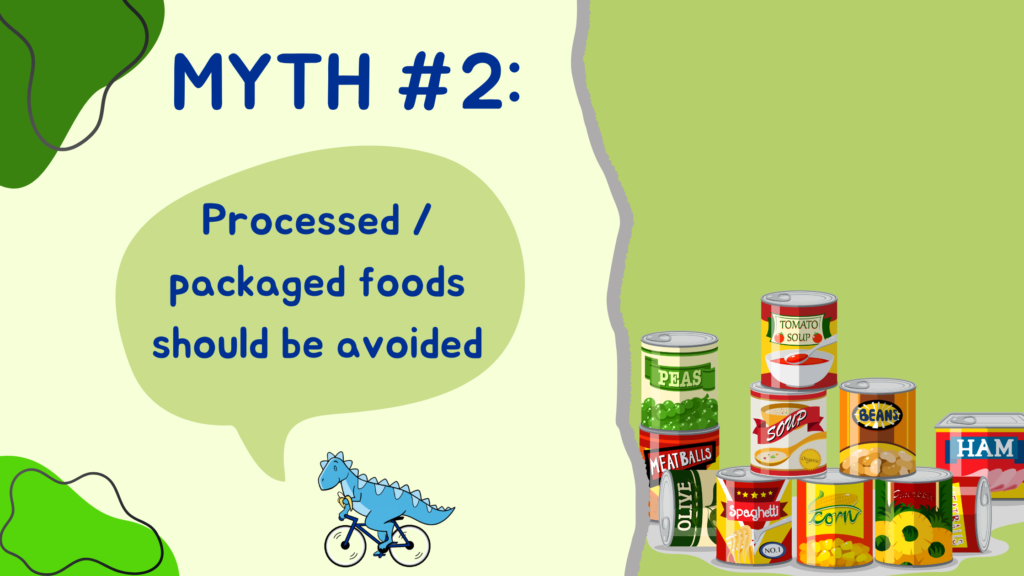
MYTH #2: PROCESSED/PACKAGED FOODS SHOULD BE AVOIDED
Admittedly, this is kind of a tricky one. Most of us have probably heard that it’s better to consume whole foods over ones that have been processed and have long ingredient lists with things like added sugars and sodium. And in general, that’s true. We should typically strive to eat mainly whole foods.
However, that doesn’t mean packaged foods are the devil and we need to avoid them at all costs.
Imagine you have a very busy schedule – perhaps you’re working long hours, or you have kids with lots of after-school activities, or you’re a student juggling classes with a part-time job, or any other situation that limits the amount of time you have to cook.
Processed and packaged foods might be convenient, quick, and easy for you, when it’s not realistic to cook every meal at this point in your life.
It doesn’t mean you might not strive to cook more once things calm down a bit, and it doesn’t mean EVERY meal, or even every element WITHIN a meal, comes out of a box. It also doesn’t mean you can’t look for some packaged options with shorter ingredient lists or less added sugar or salt, if those are things you’re concerned about.
It simply means that you can use packaged foods as a tool to make your life a little bit easier right now, and that might free up time and mental energy for what’s currently a priority.
Plus, maybe there are certain foods that are just delicious that you like to include on occasion, and they happen to be pre-packaged. (Cauliflower gnocchi from Trader Joe’s, anyone?)
My intention here is to discourage you from viewing ANY foods as ones to be completely avoided. Picking up a box of something at the store is a choice, and whether or not it’s the best choice for you right now depends on a lot of factors. It’s not good or bad.
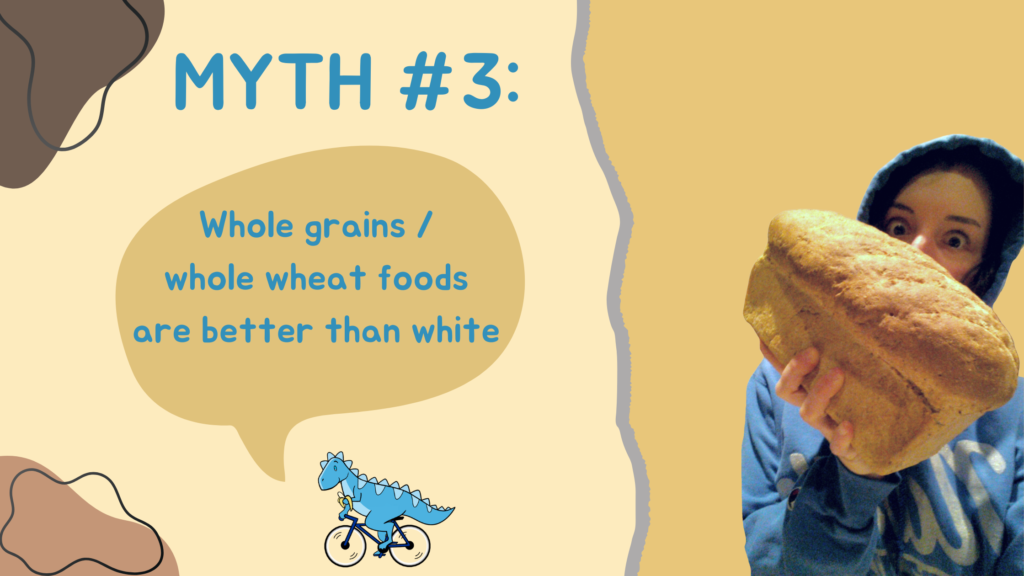
MYTH #3: WHOLE GRAINS/WHOLE WHEAT FOODS ARE BETTER THAN WHITE
Another tricky one.
I often get questions like these:
“Is brown rice better than white?”
“Is whole wheat bread better than white?”
Well…not necessarily. What does “better” mean? It depends on your goals, your intention, and what you enjoy.
Let’s compare first. In general, whole wheat flour (or another whole grain like brown rice) retains its vitamins, minerals, and fiber. Wheat flour alone (commonly known as white flour) or white rice has been processed so that most of these nutrients are removed (although I will note that some products are made with “enriched” wheat flour, meaning some vitamins have been added back in).
So, whole wheat products provide more nutritional value, and the fiber can help you feel full longer. In general, this is a good choice, especially if you’re looking for a substantial and filling meal, or if you’re trying to lose fat (you’ll feel more satiated and be less likely to snack shortly after).
However, as I said regarding processed foods, this doesn’t mean white flour is the devil and should be avoided at all costs.
For example, I usually go for whole grains like brown rice and whole wheat bread because I think they’re flavorful and filling. However, if I’m making mac and cheese, I always use regular white pasta instead of whole wheat. I think it tastes better with the cheese and I enjoy it much more.
Another example of when white flour/grain products might be a better choice is for athletes the few days before a long race such as a marathon. The quicker-digesting carbs and the lack of fiber is actually preferred and very beneficial as pre-race fuel.
Moral of the story: despite the nutritional benefits of whole grains, white bread/pasta/rice is not bad and you can include these if you enjoy them.
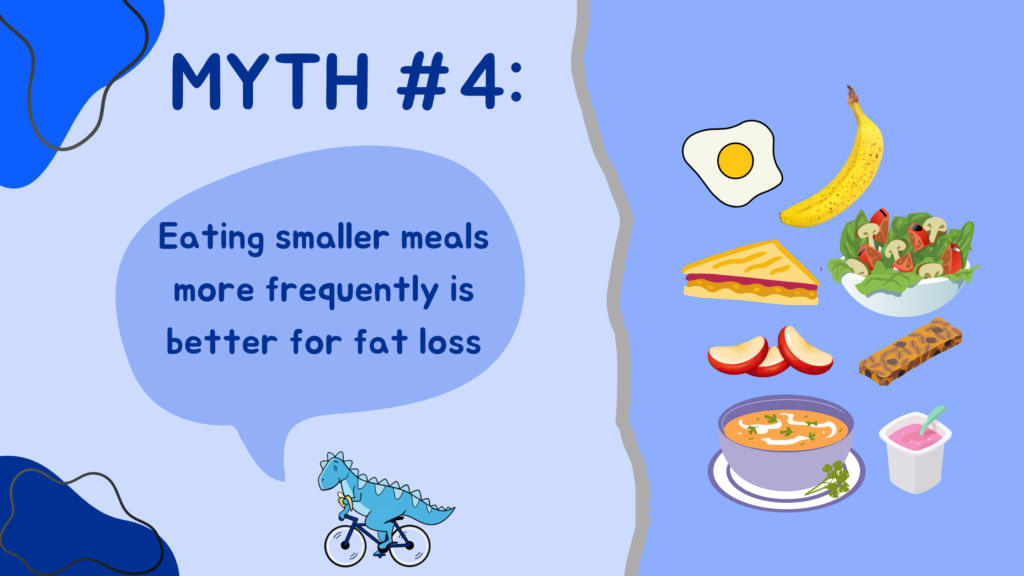
MYTH #4: EATING SMALLER MEALS MORE FREQUENTLY IS BETTER FOR FAT LOSS
Can eating smaller meals more frequently throughout the day help with fat loss? Maybe for some people, but NOT because it burns fat or works any other metabolic magic.
It’s a strategy, one that isn’t inherently better than fewer, larger meals.
Total calories consumed over the course of the day is what matters.
Why might you choose to implement this strategy of having smaller, more frequent meals?
➡️ It might prevent you from getting too hungry between larger meals and subsequently overeating.
➡️ It might be convenient for your schedule (i.e. frequent meetings with no time to sit down for lunch without eating very quickly).
➡️ If you have a sensitive gut, it may feel better to eat more frequently from a digestive perspective.
Want to give it a try for one of the above reasons? Fantastic, and it might work for you very well. Just know it’s not a necessary strategy to lose fat.
Do what works for you.
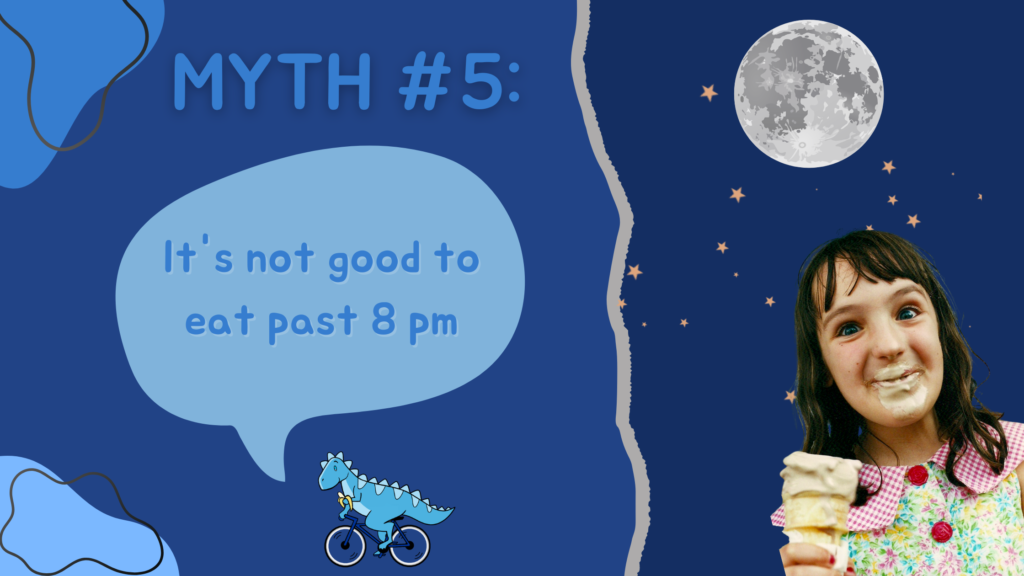
MYTH #5: IT’S NOT GOOD TO EAT PAST 8 PM
What’s the deal with eating past 8 pm? Or 7 pm, or eating carbs after a certain time, or any other variation you may have heard? Does it really screw up your metabolism and cause you to gain weight, or prevent you from losing weight if that’s your goal?
Nah.
Just like I said regarding smaller frequent meals: total calories consumed over the course of the day is what matters.
Putting food into your body when the clock reaches a certain point isn’t going to screw anything up.
Eat a late dinner due to your work schedule or other commitments? No problem. Eat super early with your young kids and find yourself hungry again at 8 pm? No problem. Want a snack or a bit of dessert before bed? No problem.
Here’s where this myth comes from, and why some believe eating late is no good:
🌙Sometimes, we snack at night for reasons other than hunger. For example: settling down in front of the TV with a bag of chips and mindlessly munching down half the bag; or, not eating enough earlier in the day and subsequently overeating after dinner. These habits may put you in a calorie surplus, and THAT’S what could cause weight gain if it’s done consistently, not because you ate the snacks at night.
🌙Some folks experience digestive issues if they eat and then lie down in bed shortly after, such as indigestion, heartburn, or acid reflux. Or, something they ate leaves their stomach feeling heavy and they have a hard time falling asleep. This is different from fat gain or any metabolism shifts, and if it happens to you, it is worth considering a slightly different eating schedule or experimenting with snacks that don’t cause this discomfort.
So, “rest” assured: there’s nothing wrong with eating past a certain time.
Hopefully this article has caused you some relief – you no longer have to feel guilty buying that canned product you love, eating full meals, snacking after dinner, having white rice in your burritos, having a white tortilla for your burritos, or having burritos at all because they involve carbs.
Remember, there’s no good or bad, no food is the devil, and everything is fine in moderation if you enjoy it.
Happy carb-ing!
-Dina

Dina Grimaldi is a triathlon & nutrition coach who helps athletes reach their goals while finding the balance they need to fit training comfortably into their lives, and who guides and supports those with nutrition or health goals to cultivate a lifestyle of sustainable habits and a healthy relationship with food.